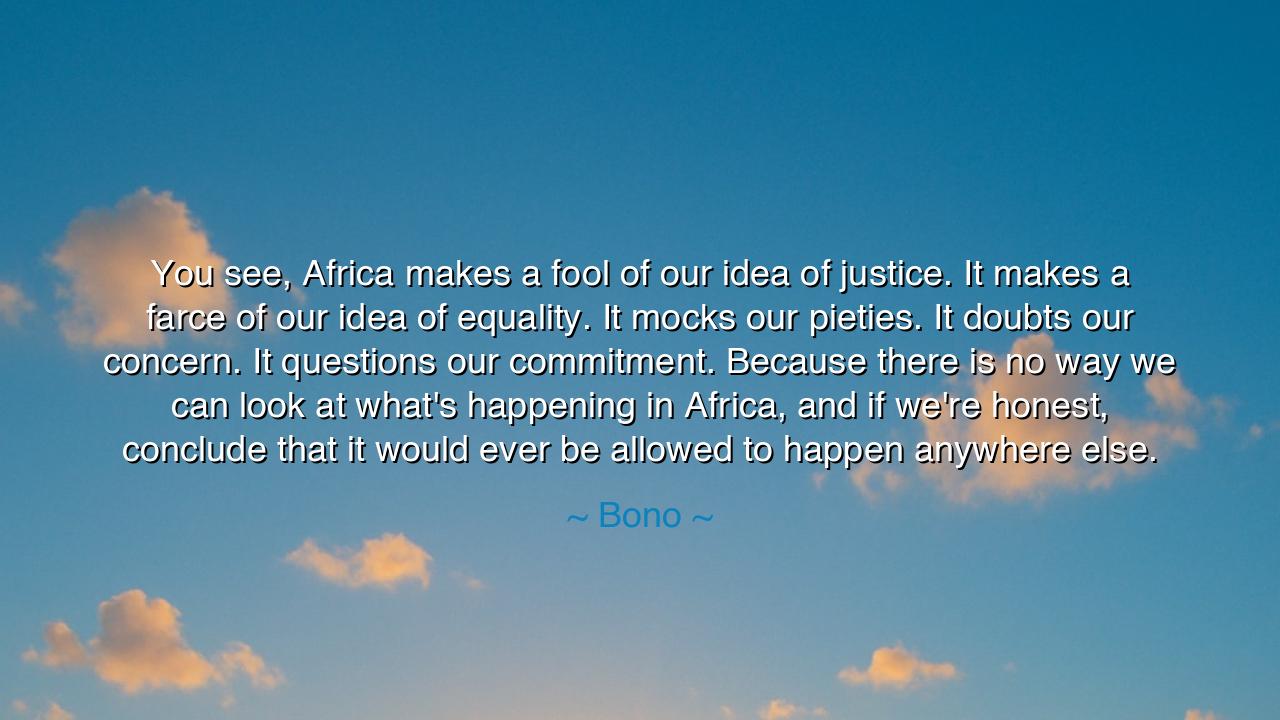
You see, Africa makes a fool of our idea of justice. It makes a
You see, Africa makes a fool of our idea of justice. It makes a farce of our idea of equality. It mocks our pieties. It doubts our concern. It questions our commitment. Because there is no way we can look at what's happening in Africa, and if we're honest, conclude that it would ever be allowed to happen anywhere else.






The words of Bono, “You see, Africa makes a fool of our idea of justice. It makes a farce of our idea of equality. It mocks our pieties. It doubts our concern. It questions our commitment. Because there is no way we can look at what’s happening in Africa, and if we’re honest, conclude that it would ever be allowed to happen anywhere else,” strike like a trumpet calling the conscience of the world to awaken. In them lies the cry of a witness — a man who has seen both abundance and despair, and who dares to hold a mirror to humanity’s hypocrisy. His words expose the vast chasm between what we claim to believe and what we actually allow, between the sermons of justice we preach and the silence we keep when injustice thrives beyond our borders.
To understand this, one must first hear the moral thunder hidden within his tone. Bono, the musician and activist, has long stood not merely as a singer of songs, but as a prophet of conscience, using his fame to confront the world’s apathy toward the suffering of the poor, the sick, and the forgotten. His voice rose in an age when the world had grown numb to distant pain — when famine in Ethiopia, genocide in Rwanda, and exploitation across the continent were met with sympathy, but not action. Through this quote, he challenges that paralysis. He tells us that Africa — in its suffering, its endurance, and its humanity — is a mirror reflecting the moral failures of the modern world.
In the ancient times, the prophets of Israel spoke in much the same way. They cried out against nations that prayed with eloquence but ignored the hungry at their gates. They said that true worship was not in words but in justice, that the measure of a people was found not in their wealth but in their compassion. So too does Bono speak in their spirit. When he says that Africa “makes a fool of our idea of justice,” he means that our modern systems — built on pride, profit, and politics — crumble before the raw truth of suffering unaddressed. The plague of poverty, the weight of disease, and the theft of dignity reveal that our equality is conditional, our justice selective, and our concern shallow.
History gives us many such examples. Consider the Rwandan genocide of 1994, when nearly a million lives were extinguished while the world watched in calculated silence. The same powers that claim to guard liberty and human rights turned away, unwilling to risk their comfort for another’s survival. Yet when terror strikes closer to their shores, armies mobilize, and compassion becomes swift. This is the inequality Bono speaks of — not of wealth alone, but of worth. The blood of some seems to matter more than the blood of others, and thus the soul of the world grows divided against itself.
And yet, there is more than condemnation in his words — there is a call to awakening. For even in Africa’s suffering, Bono sees the possibility of redemption, not only for a continent, but for the conscience of humanity. Africa “mocks our pieties” because it reminds us that faith without action is hollow. It “questions our commitment” because it asks whether our love for justice can survive when there is no reward, when no one is watching. In this sense, Africa becomes not a symbol of tragedy, but a teacher — showing us the gap between intention and integrity.
The ancients would have called this a trial of the soul. They believed that nations, like men, are judged not by their power but by their mercy. If the powerful neglect the weak, if they hide behind excuses and bureaucracy while others starve, then their empires are already decaying from within. Bono’s words recall this eternal law: that the measure of civilization lies in how it treats those who have no voice. To claim justice and yet ignore suffering is to build a palace upon sand; sooner or later, it collapses under the weight of its own hypocrisy.
Let this be the teaching for future generations: do not turn away from the cries of the distant, for distance is an illusion — the pain of one is the pain of all. Let your compassion not be seasonal, your charity not selective. If you believe in equality, live it. If you believe in justice, defend it where it is weakest. For in the face of Africa’s endurance — and of every oppressed people across the earth — humanity is being tested. And if we fail to answer that test with courage and humility, then we have not only abandoned Africa; we have betrayed ourselves.
Thus, Bono’s words stand as both an accusation and a prophecy — a mirror and a torch. They remind us that to heal the world, we must first confront the corruption of our own hearts. Justice is not a theory; it is an action. Equality is not a slogan; it is a sacrifice. And only when we love others as fiercely as we defend ourselves will the world rise from its long night of indifference and walk, at last, toward the dawn of true humanity.






AAdministratorAdministrator
Welcome, honored guests. Please leave a comment, we will respond soon